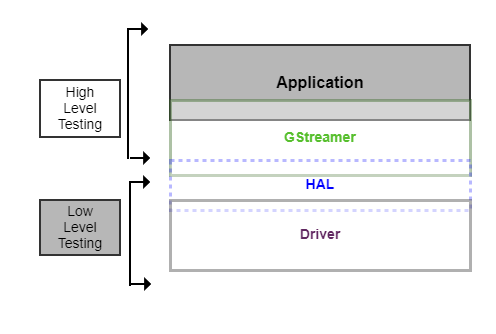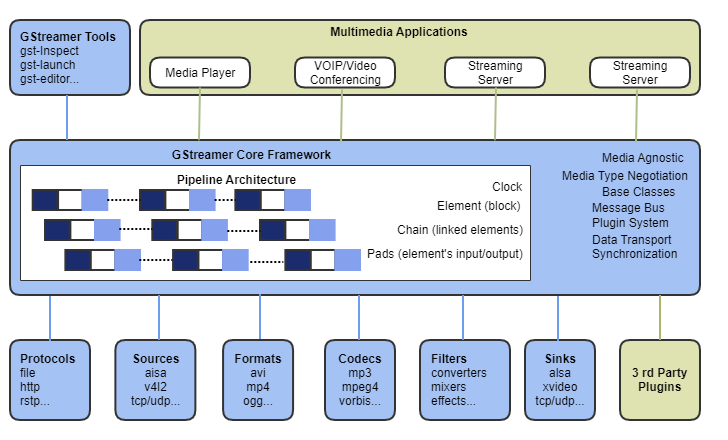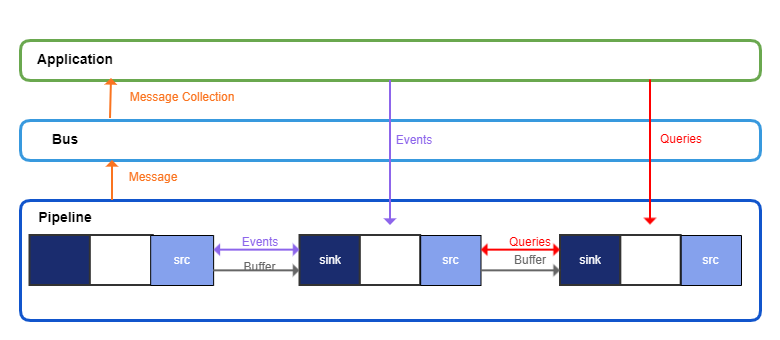GStreamer Analysis
Introduction
The purpose of this document is to simplify some of the terms, descriptions, and mechanisms of the GStreamer core. It will, initially, serve as a foundation to help model and test the GStreamer implementation in the RDK/HAL system.

This document describe the details of the following,
- API for multimedia applications
- Plugin architecture
- Pipeline architecture
- Mechanism for media type handling, negotiation, synchronization
Performance
- Data passing between plugins is lightweight (pointers reduce overhead)
- Shared memory mechanism
- Sub-buffers split buffers into manageable pieces (blocking)
- Dedicated streaming threads with scheduling handled by the kernel
Plugin
- Protocol handler (loaded at runtime)
- Sources: audio/video (protocol plugins)
- Formats: parsers, formaters, muxers, demuxers, metadata, subtitles
- Codecs: coders/decoders
- Filters: converters, mixers, effects
- Sinks: audio/video (protocol plugins)
Object Model
- Adheres to GObject (Glib 2.0)
- Uses signals and object properties
Architecture

GST-Element
- Has one specific function (read, decode, …)
- Has two Pads:
- source (output)
- sink (input)
- GStreamer core views elements as blocks of bytes
- Linked or chained elements create a pipeline that performs a specific task

GST-Element Pad
Is defined by two properties:
- direction: source, sink
- availability: always, sometimes (dynamic), on request
ghost pad: a pad from some element in the bin that can be accessed directly from the bin as well.
GST-Bin
- A container for a collection of elements (manages the state of all elements within it)
- Forwards bus messages from contained elements (errors, tags, EOS)
- Simplifies implementing complex pipelines by allowing the break up of the pipeline into smaller blocks
GST-Pipeline
- A top-level bin
- A generic container that manages the synchronization and bus messages of the contained elements.
- Contains a bus by default
GST-Bus
- A bus is a simple system that forwards messages from the streaming thread to an application in its own thread context.
GST-Bus Message Types
All messages contain a message source, type, and time-stamp.
- Error: fatal message that terminate data-passing
- Warning: non-fatal message, but user-visible problems will happen
- Information: non-problem notification
- End of Stream: emitted when the stream had ended
- Tags: emitted when metadata is found in the stream
- State-changes: emitted after a successful state change
- Buffering: emitted during caching of network-streams
- Element: special messages that are unique to certain elements and usually represent additional features.
- Application-specific: primarily meant for internal use in applications in case the application needs to marshal information from some thread into the main thread
GST Communication Mechanisms
- Buffer: objects for passing streaming data between elements in pipeline
- travel downstream
- Events: objects sent between elements or from the application to elements
- travel downstream and upstream
- Messages: objects posted by elements on pipeline’s message bus (element to application)
- handled synchronously from pipeline to bus; asynchronously from bus to application
- Queries: allow applications to request information from pipeline
- travel downstream and upstream; always handled synchronously
Communication Control Flow
- Downstream : src element to sink element
- Upstream: sink element to src element

Buffer Actual media data. A simple buffer consists of:
| Events Control information. | Messages Information on elements or pipeline. A message consist of:
| Queries Request for a specific stream property related to progress tracking. |
|---|
GST-Element Types
- Source: generates data
- Filter: performs task on input data to send proper output data (convertors, demuxers, muxers, codecs etc)
- Sink: receives data
These 3 types of elements create a simple GST-Pipeline.

Pipelining is an implementation technique whereby multiple instructions are overlapped in execution; it takes advantage of parallelism that exists among the actions needed to execute an instruction.
GST-Element States
- GST_STATE_NULL: default state; no resources are allocated in this state
- GST_STATE_READY: an element has allocated all of its global resources within the stream, but the stream is NOT open yet.
- GST_STATE_PAUSED: an element has opened the stream, but no actively processing it. (clock does NOT run)
- GST_STATE_PLAYING: an element maintains the open stream while processing it. (clock starts)
Porting
The following is a list of components that might be needed to properly test implementation of the HAL GST components
- aesdecyrpt
- aesencrypt
- dtcpdecrypt
- dtcpencrypt
- httpsink
- rbifilter

